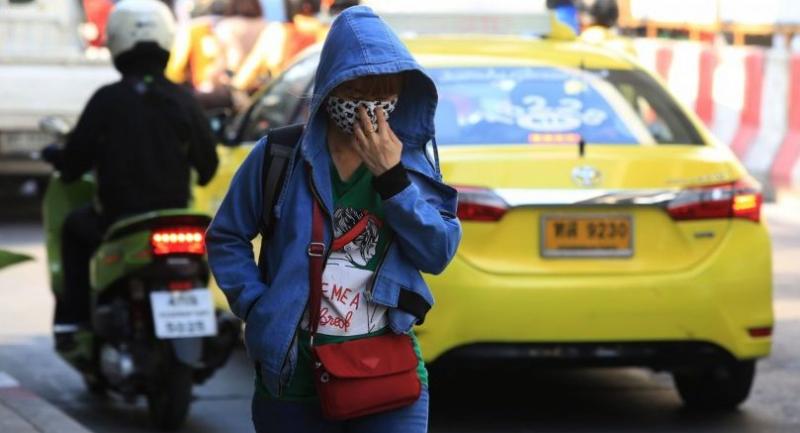Ratchaburi schools limit outdoor time

MANY SCHOOLS in Ratchaburi, which is among the central provinces affected by air pollution, have told their students to wear facemasks for protection against PM2.5 (particles with diameter 2.5 micrometers or smaller).

Ratchaburi cited the Air Quality Index (AQI) reading as within the range of 101-200 where public health was affected. The country’s AQI safety limit is 100. The PM2.5 level yesterday in the province was about 77 micrograms per cubic metre of air – the safe PM2.5 level is under 50 micrograms. Ratchaburi had seen PM2.5 peak at 98 micrograms on Saturday.
To tackle the issue, deputy provincial governor Wisa Pulsirirat said he had assigned local administrative organisations to join business operators in covering construction material piles and spraying water around construction sites and on vehicles leaving the sites. Wisa said concrete-making sites were also subjected to strict dust-prevention measures.

In communities, the local bodies were told to spray water to clean roads while schools were told to avoid – or at least minimise – outdoor activities for students in the morning, he said.
Outdoor activities are still allowed from 1pm-5pm when the dust amount is minimal, he said. If any student develops asthma symptoms or chest tightness from a respiratory issue, the student must be sent to a doctor, he added. Many schools had their pupils wear facemasks. Naree Wittaya School in Muang district told its administrators to send a text message asking parents to have their children wear facemasks in light of the high PM2.5.
Sport takes backseat
Currently, all schools – with the exception of the morning flag-raising routine – have suspended other outdoor activities and sports classes.
Meanwhile, Prime Minister Prayut Chan-o-cha pointed out that he had personally experienced the impact of farm-clearing through burning. He said during his helicopter ride to Sara Buri province earlier yesterday, he was exposed to such smoke, which caused him irritation in the eyes. He warned that such activities were illegal hence villagers must avoid them.

“Kamnan, village headmen and local administrators should explain to villagers that such actions cause pollution. They should use other methods to dispose of their agricultural wastes such as by burying. If one person thinks he can set fire to burn his rice stalks, there should be no problem. But imagine if many people start thinking the same way, there will be too many fires, which becomes a huge problem,” Prayut said.
He called for countries to join in regional cooperation to curb the problem as each country has agricultural and industrial activities that contributed to climate change.
The premier told people in Sara Buri province, who welcomed him at the Phu Khae Botanical Garden in Chalerm Phrakiat district, that climate change had affected countries worldwide, not just Thailand. He said many countries had become exposed to high amounts of fine particle dusts with some countries suffering up to 400 micrograms while Thailand’s levels were on average at 50-70 micrograms per cubic metre of air.
Meanwhile, the PCD said in its daily update on the PM2.5 situation that 12 roadside areas of Greater Bangkok were beyond safety levels yesterday morning. They included the Rama II roadside spot in Samut Sakhon’s Muang district at 71 micrograms, and the Rama III roadside spot in Bangkok’s Bang Kho Laem district at 57 micrograms.

A police officer wears a facemask as a shield against dust pollution yesterday while directing traffic on Chakra Phet Road in Bangkok’s Phra Nakhon district.
PCD chief Pralong Damrongthai clarified that his department had conducted an Environmental Protection Agency-standard air quality mathematical model on January 20 when Cambodia saw a peak of 895 hot spots. It showed that tiny particle dusts from Cambodia spilled over only to the border province of Trat and then moved onwards to the Gulf Of Thailand, without reaching Bangkok as rumoured. He also cited a similar report from the Asean Specialised Meteorological Centre (ASMC) that winds carried smog from Cambodia through Trat to the Gulf.
Pralong affirmed that Bangkok and the five provinces in its vicinity – Nakhon Pathom, Nonthaburi, Pathum Thani, Samut Prakan and Samut Sakhon – had all banned outdoor burning during this period. Other provinces such as Nakhon Sawan, Phichit, Kamphaeng Phet, Uthai Thani, Chai Nat and Sa Kaew had also been asked to refrain from outdoor burning as the smoke from there could affect Bangkok.
The Asian Institute of Technology said that 52 per cent of PM2.5 came from vehicles’ exhaust smoke, 35 per cent from outdoor burning, seven per cent from other areas and six per cent from other sources such as soil.
